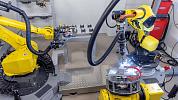- FMA
- The Fabricator
- FABTECH
- Canadian Metalworking
Categories
- Additive Manufacturing
- Aluminum Welding
- Arc Welding
- Assembly and Joining
- Automation and Robotics
- Bending and Forming
- Consumables
- Cutting and Weld Prep
- Electric Vehicles
- En Español
- Finishing
- Hydroforming
- Laser Cutting
- Laser Welding
- Machining
- Manufacturing Software
- Materials Handling
- Metals/Materials
- Oxyfuel Cutting
- Plasma Cutting
- Power Tools
- Punching and Other Holemaking
- Roll Forming
- Safety
- Sawing
- Shearing
- Shop Management
- Testing and Measuring
- Tube and Pipe Fabrication
- Tube and Pipe Production
- Waterjet Cutting
Industry Directory
Webcasts
Podcasts
FAB 40
Advertise
Subscribe
Account Login
Search
Earth may not be flat, but the economy is
- By Vicki Bell
- January 30, 2014
You no doubt have heard many experts weigh in on the economy, and you may have heard the 2014 State of the Union address, which focused a lot on economic conditions. Yes, we want to know what others think, what the trends are, and where experts think we are headed. But those who weigh in seem to have differing opinions, and much of what they say is spun to fit an agenda.
In his address, the President had a lot to say about the U.S. economy. He noted the difficult times we’ve been through and heralded improvement in unemployment, housing, energy production, and deficit-cutting. We want to hear good, encouraging news, particularly now, when the economy has languished for such a long period. However, according to the fact checkers at the Washington Post the President’s paintbrush was probably a little too rosy.
The Post published a guide to some of the President’s “more fact-challenged claims,” in the order in which he made them: “The more than eight million new jobs our businesses have created over the past four years;” “A manufacturing sector that’s adding jobs for the first time since the 1990s;” “Our deficits—cut by more than half;” “Inequality has deepened. Upward mobility has stalled;” “Today women make up about half our workforce. But they still make 77 cents for every dollar a man earns. That is wrong, and in 2014, it’s an embarrassment;” and “More than nine million Americans have signed up for private health insurance or Medicaid coverage.”
Based on supporting data, none of these statements is completely accurate, and they present a misrepresentation of where things really stand. You can learn more by reading the guide.
Among the more undisputable statements in the address is the acknowledgement that the “simple, profound belief in opportunity for all, the notion that if you work hard and take responsibility, you can get ahead in America” has “suffered some serious blows,” not the least of which is the loss of good, middle class jobs. The loss has “weakened the economic foundations that families depend on.”
Really? Did you need the President or economic experts to tell you this. Was this some new revelation? Of course not. You could have made this point and probably backed it up with very personal examples, just as the President did when he singled out different individuals to highlight his topics.
The American public knows all too well where the economy stands. Harris Interactive surveyed 2,236 adults online between January 15 and 20. While the President cites sizeable gains, most Americans believe the economy is pretty flat. Just under three in 10 (28 percent) give the President positive marks for handling the economy, while 72 percent gave him negative ratings. This is similar to last month, in which 29 percent gave him positive marks and 71 percent gave him negative ones.
Looking at individual households, half of Americans (49 percent) believe their household's financial condition will stay the same over the next six months, while 23 percent say it will get better and 29 percent believe it will be worse. Last November, as many Americans were getting started on their holiday spending, again half (50 percent) said it would stay the same, three in 10 (30 percent) said their household finances would get worse, and 20 percent believed they would be better in the next six months.
And about those job gains … almost half of U.S. adults (48 percent) say the current job market in their region of the country is bad, one in five (21 percent say it is good, and three in 10 (31 percent) say it is neither good nor bad. This is almost unchanged from October, when 20 percent said it was good, 48 percent said it was bad and 32 percent of U.S. adults said the job market in their region was neither good nor bad. Looking at job markets by region, the South seems to be more optimistic than the East or Midwest about how theirs is. Almost three in 10 Southerners (28 percent) say the job market in their region is good, compared to 16 percent of Midwesterners and 17 percent of Easterners who say the same.
Looking ahead, one-quarter of Americans (24 percent) say the job market in their region over the next six months will be better, and 23 percent say that it will be worse; over half (53 percent) believe it will remain the same. This is up a little from October when over one-quarter of U.S. adults (27percent) said the job market in their region would be worse and one in five (20 percent) thought it would improve over the next six months.
The President spoke a lot about creating jobs in various sectors, such as infrastructure and clean energy.
Déjà vu.
Most encouraging was his statement recognizing something manufacturers long have espoused: “Both Democrats and Republicans have argued that our tax code is riddled with wasteful, complicated loopholes that punish businesses investing here, and reward companies that keep profits abroad. Let's flip that equation. Let's work together to close those loopholes, end those incentives to ship jobs overseas, and lower tax rates for businesses that create jobs right here at home."
High time.
As always, the State of the Union address was dramatic and inspirational. What really matters, though, is what comes next. Without a major shift in Congressional cooperation (what cooperation?), it won’t be much.
Follow fabcomlady on Twitter.
Become a fan of The Fabricator® on Facebook.
subscribe now

The Fabricator is North America's leading magazine for the metal forming and fabricating industry. The magazine delivers the news, technical articles, and case histories that enable fabricators to do their jobs more efficiently. The Fabricator has served the industry since 1970.
start your free subscriptionAbout the Author

Vicki Bell
2135 Point Blvd
Elgin, IL 60123
815-227-8209
- Stay connected from anywhere

Easily access valuable industry resources now with full access to the digital edition of The Fabricator.

Easily access valuable industry resources now with full access to the digital edition of The Welder.

Easily access valuable industry resources now with full access to the digital edition of The Tube and Pipe Journal.
- Podcasting
- Podcast:
- The Fabricator Podcast
- Published:
- 04/30/2024
- Running Time:
- 53:00
Seth Feldman of Iowa-based Wertzbaugher Services joins The Fabricator Podcast to offer his take as a Gen Zer...
- Industry Events
Pipe and Tube Conference
- May 21 - 22, 2024
- Omaha, NE
World-Class Roll Forming Workshop
- June 5 - 6, 2024
- Louisville, KY
Advanced Laser Application Workshop
- June 25 - 27, 2024
- Novi, MI
Precision Press Brake Certificate Course
- July 31 - August 1, 2024
- Elgin,































